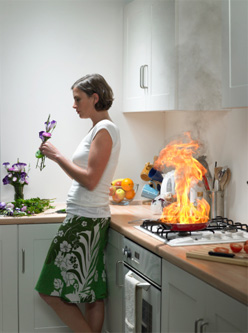 A rental home belongs to a homeowner. However, that homeowner leases the home to a renter. By contract, renters agree to maintain certain degrees of upkeep for the home. For that reason, both parties in the deal have to do their part to see to the home’s preservation and maintenance. Generally, leases stipulate how homeowners and renters share these responsibilities.
A rental home belongs to a homeowner. However, that homeowner leases the home to a renter. By contract, renters agree to maintain certain degrees of upkeep for the home. For that reason, both parties in the deal have to do their part to see to the home’s preservation and maintenance. Generally, leases stipulate how homeowners and renters share these responsibilities.
As the renter usually lives in and uses the home from day to day, they have to prevent damage to the home. Should damage occur, it often calls both the renter and the owner’s insurance policies into account.
Carrying Insurance for a Rental
Many homeowners require their renters to carry certain degrees of renters insurance coverage. Renters insurance helps protect both the homeowner and the renter in case a hazard or peril strikes the residence.
Renters insurance liability coverage can help protect the renter in case their actions or property causes illness or injury to others. The renter may have to use their liability coverage to pay for the medical bills or property repairs of the harmed party. This coverage might also cover legal fees relating to a lawsuit because of the damage claim.
Personal property coverage, by contrast, helps protect the renter’s own belongings in the residence. When buying a renters policy, insurance agents usually ask renters to place a monetary value on their personal property. The insurer then might be able to issue coverage limits up to this value. If a renter needs to use insurance to repair or replace personal property, they can often use this coverage.
Claiming Damage on Renters Insurance
When damage occurs, renters often have to consider who owns the property to determine if and how to use their renters insurance.
- If the renter is at fault party for the damage, they may have an obligation to compensate the property owner or other parties for the damage. They might turn to their renters insurance to do so. When other hazards damage the property, both renters insurance and the property owner’s personal insurance coverage may come into play.
- When a renter damages his or her own personal property, contents coverage often provides the needed protection.
- Should the renter damage rental property belonging to the property owner, the liability coverage might cover the damage. Perhaps the renter installs a satellite dish, which falls off of the roof and damages part of the home. Liability insurance may come into play.
It is always best for the renter to determine how their policies cover property damage. Coverage limits and exemptions may restrict whether certain damage qualifies for an insurance payout. Renters should talk to the property owner and their insurance agent to determine how best to protect themselves on the property. Doing so could greatly reduce the financial liabilities of a renter in case of damage to their own property or the owner’s property.
We’ve got you covered. Call Peachstate Insurance at 877.997.2478 for a free Douglasville renters insurance quote.